
Maldives President Mohamed Muizzu arrives to cast his ballot for parliamentary election at a polling station in Mali, Maldives
Credit: PTI File Photo
The perception that India is upset over ‘pro-China’ Maldivian President Mohamed Muizzu sweeping the parliamentary polls in April after his unseating incumbent ‘India-friendly’ Ibrahim Solih in September elections last year has no basis. New Delhi is yet to comment on Muizzu-led PNC-PPM combine’s 77-seat tally (including allies and independents) in the 93-member House for anyone to draw any conclusion. The silence, to some, is a message in itself though.
However, as expected, bilateral relations are set to improve now after the twin polls. According to reports, Foreign Minister Moosa Zameer is set to visit New Delhi in the coming week, the first real high-level exchange between the two nations, after a perfunctory meeting between President Muizzu and Prime Minister Narendra Modi at distant Dubai months back.
Like the Maldivian stakeholders, including Team Muizzu, New Delhi might have been surprised, not shocked, by the poll outcome. There is a pattern of the elected president getting a favourable parliament after the failure of the executive-legislature cohabitation led to avoidable deadlocks during President Mohammed Nasheed’s shortened term, 2008-12. The massive Muizzu victory this time also reflected the people’s anger at the parliamentary antics of Solih’s MDP, which included an open plot to impeach the President even before he had settled down.
Like the presidential poll, the parliamentary elections were purely a domestic affair of Maldives. India was never on the ballot paper, then or now. For Candidate Muizzu, of course, the ‘India Out’ campaign was a legacy issue then, having hijacked the Opposition PNC-PPM ticket from jailed former President Abdulla Yameen. Muizzu surprised incumbent Solih, whose readjustment to the new reality cost him time and his re-election. Muizzu did not talk about India this time.
Domestic politics
It is true of India’s other neighbours, too, as domestic politics and conditions influence local elections. India gets a free mention only because India-watching is both a profession and pastime for the local population as a whole – just as the US/China-watching was/is in India, during the Cold War and post-Cold War eras, respectively.
There are issues, yet, elsewhere in the neighbourhood, too. The street perception in Bangladesh that India is ‘pro-Hasina’ can disturb bilateral equations as and when she is no longer at the helm. The same may be true of Nepal, too, but Indian observers of the neighbourhood scene can take heart by studying the transformation of India’s relations with Sri Lanka over the past couple of years, drawing the line where China’s nose should end.
Against this, India’s handling of the Taliban in Afghanistan is trickier. The whole world has not yet found a via media, and New Delhi is no exception. Where the Myanmarese junta is concerned, India shares a long and complicated border with that country, and insurgencies too. New Delhi has little choice. After all, the short-lived democratic government led by the NLD chief Aung San Suu Kyi too was not handling Myanmarese insurgents with kid gloves!
N SATHIYA MOORTHY
(The writer is a policy analyst and political commentator based in Chennai)